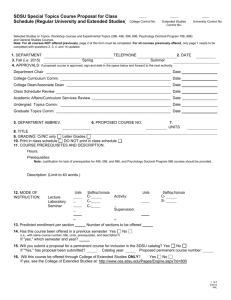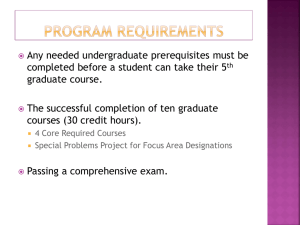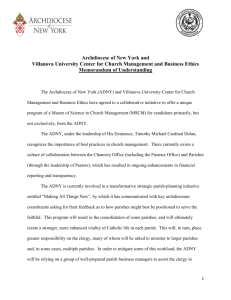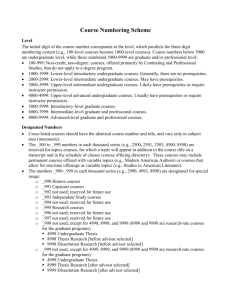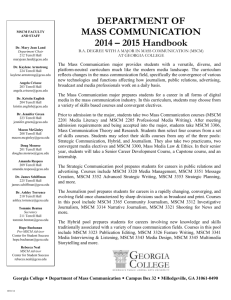Program Revision Proposal - Kennesaw State University
advertisement
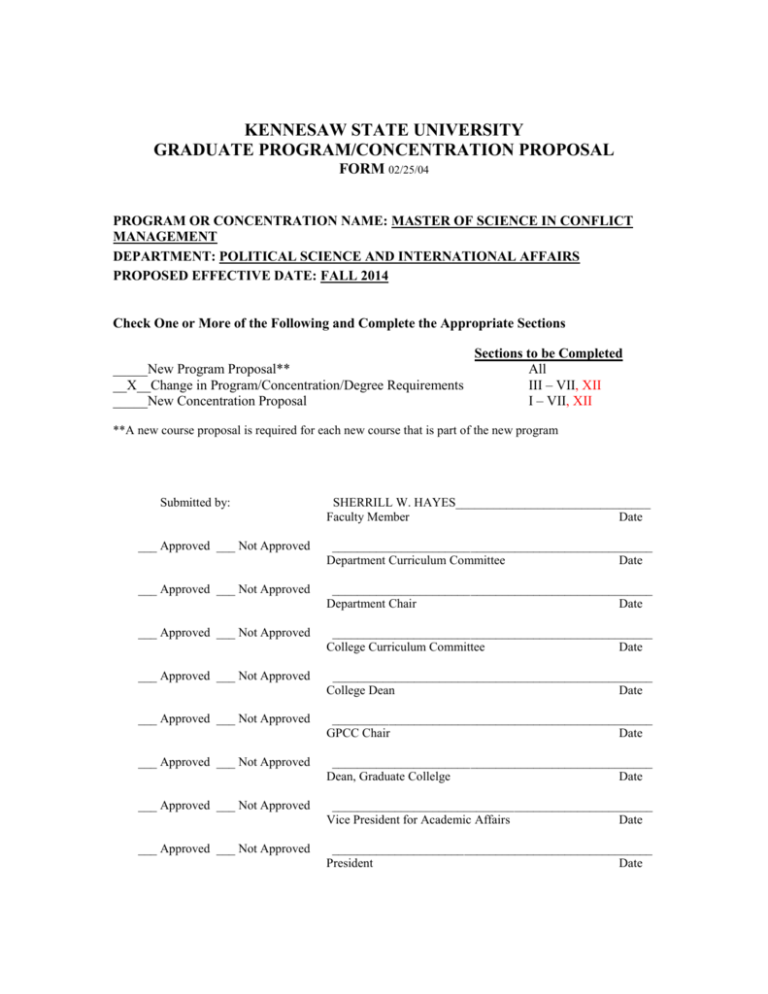
KENNESAW STATE UNIVERSITY GRADUATE PROGRAM/CONCENTRATION PROPOSAL FORM 02/25/04 PROGRAM OR CONCENTRATION NAME: MASTER OF SCIENCE IN CONFLICT MANAGEMENT DEPARTMENT: POLITICAL SCIENCE AND INTERNATIONAL AFFAIRS PROPOSED EFFECTIVE DATE: FALL 2014 Check One or More of the Following and Complete the Appropriate Sections _____New Program Proposal** __X__Change in Program/Concentration/Degree Requirements _____New Concentration Proposal Sections to be Completed All III – VII, XII I – VII, XII **A new course proposal is required for each new course that is part of the new program Submitted by: SHERRILL W. HAYES_______________________________ Faculty Member Date ___ Approved ___ Not Approved ___________________________________________________ Department Curriculum Committee Date ___ Approved ___ Not Approved ___________________________________________________ Department Chair Date ___ Approved ___ Not Approved ___________________________________________________ College Curriculum Committee Date ___ Approved ___ Not Approved ___________________________________________________ College Dean Date ___ Approved ___ Not Approved ___________________________________________________ GPCC Chair Date ___ Approved ___ Not Approved ___________________________________________________ Dean, Graduate Collelge Date ___ Approved ___ Not Approved ___________________________________________________ Vice President for Academic Affairs Date ___ Approved ___ Not Approved ___________________________________________________ President Date UNIVERSITY SYSTEM OF GEORGIA NEW GRADUATE PROGRAM PROPOSAL TITLE Kennesaw State University DATE DEPARTMENT COLLEGE Proposed Start Date: CIP:______ I. Program Description Unique Aspects of Program Institutional Importance of the Program KSU's Strategic Plan System and State of Georgia Goals Staffing, Facilities and Enrollment II Objectives of the Program III Justification and Need for the Program The Master of Science in Conflict Management (MSCM) was first offered in Fall 2000. As a premium-priced, cohort-based, executive style program, faculty and staff work closely with students over the course of their 16 months in the program, both in classes on alternating weekends and during their field experiences. Because faculty and students work so closely, faculty can modify and focus content during the course the curriculum and occasionally it becomes evident that some of these changes should be formalized into the curriculum. Since the inception of the program, there has only been one curriculum change in the program (Fall 2009), which focused primarily on modifying the credit structure. We felt that the program needed an update based on program assessments, student feedback, the addition of new faculty, changes in the field, and the creation of the PhD program in International Conflict Management (INCM). The MSCM proposes to subdivide two existing courses in the spring semester so that credit hours are allocated differently and courses can be offered at different points in the program or in different combinations. The proposed changes will allow more flexibility in the timing of courses, clearer distinction of the curriculum offered for students, the future ability to create some embedded certificates in the program, and opportunities INCM PhD students to take some skills focused courses and reduce curricular overlap. These changes do not result in any new curriculum, faculty, resources, graduates, or overall credit hours. IV Procedures Used to Develop the Program The changes proposed, primarily subdividing existing courses, were the result of student feedback and faculty consultation. The feedback received caused us to reevaluate how credit hours were assigned and the timing of courses. With 9 hours being a full-time load for a graduate student, there was no flexibility to adjust the order of the courses or to pair them with other courses during a single semester. The MSCM Program currently has two full-time staff (one Administrative Director and one Administrative Assistant), and four and a half faculty considered “core” to the program. The faculty include two full professors, two associate professors (one of whom serves as MSCM Program Director), and two assistant professors. All MSCM faculty are appointed to the Department of Political Science and International Affairs and have primary teaching assignments in the program, with the exception of one assistant professor who is on a joint appointment with the Department of Psychology. V Curriculum: Degree Program Requirements The changes proposed, subdividing existing courses, were the result of student feedback and faculty consultation. The feedback received caused us to reevaluate how credit hours were assigned and the timing of courses. The MSCM program and curriculum can also be more flexible with the proposed changes. By adapting to the needs and requests of students, the program stays relevant and useful. We hope that through offering a program of study that grows and changes with the students we serve, the MSCM will become even more attractive to potential students. Additional faculty members have been hired since the last curriculum revision to accommodate a wider range of options and growth in the program; however, MSCM strives to maintain small cohorts with 25 students or less. Catalog description The primary objective of the MSCM is to produce students who: (1) understand the nature of conflict from the perspective of multiple disciplines; (2) understand the continuum of responses to conflict; (3) possess the necessary skills to facilitate the management of various types of conflict; (4) demonstrate the ability to analyze and research conflict in an organizational environment; (5) demonstrate the ability to design conflict intervention procedures and strategies appropriate to a particular situation or environment; (6) demonstrate the ability to evaluate the efficacy of a given intervention or system of interventions; and (7) successfully participate in conflict management on a practical level in one or more specific environments. The Master’s program prepares students to identify and pursue opportunities for a new career based on conflict management expertise. The MSCM also provides students with enhanced credentials to pursue career advancement in an existing work environment. Program Admission Requirements: Completed Graduate Application for Admissions. Application Fee of $60. Official transcripts from all universities and colleges attended. Official score report from the GRE, GMAT, or LSAT (requirement waived with successful completion of an advanced degree). Personal statement explaining why you are interested in the MSCM program and what you plan to do with the degree. A current resume or curriculum vitae. Two letters of recommendation from professional or academic sources. The letters should verify your ability to complete graduate level work and your potential for excellence in the field of conflict management. An official TOEFL or IELTS score report. Students from countries where English is the primary or official language do not need to submit TOEFL scores. Students who have an accredited US degree also do not need to submit TOEFL scores. Course Offering Schedule and Plan-of-Study Core Courses (36 Credit Hours) CM 7210 Foundations and Theories of Conflict Management: Conflict Theory CM 7220 Foundations and Theories of Conflict Management: Negotiation Theory CM 7230 Foundations and Theories of Conflict Management: ADR Continuum CM 7205 - Basic Mediation Skills CM 7305 - Advanced Conflict Management Skills CM 7310 Critical Knowledge and Skills of Conflict Management: Interpersonal, Intergroup, and Community Conflict and Workplace/Organizational Conflicts CM 7310 Critical Knowledge and Skills of Conflict Management: Interpersonal, Intergroup, and Community Conflict CM 7315 Organizational and Workplace Conflict CM 7325 Advanced Civil Mediation Clinic OR CM 7355 Advanced International Mediation Clinic CM 7335 Organizational Leadership OR CM 7365 Humanitarian Crisis Intervention CM 7320 Critical Knowledge and Skills of Conflict Management: Public Policy Disputes, Cross-Cultural and International Conflict Resolution CM 7400 - Conflict Management Research Methods CM 7500 - Conflict Management Systems Design CM 7600 - Study of a Specific Conflict Management Environment CM 7710 Domestic/The Practice of Conflict Management: Field Experience or CM 7715 International/The Practice of Conflict Management: Field Experience CM 7720 The Practice of Conflict Management: Field Study and Internship Reports CM 7705 - Advanced Applied Skills Training Course Offering Schedule and Plan-of-Study Due to the cohort nature of the MSCM program, all students take every class together, on weekends where there are options, students are required to take one option. The following is a schedule showing the order of courses. Whether students begin in fall or spring, they will follow the same order of courses. 1st Semester CM 7210 CM 7220 CM 7230 CM 7205 2nd Semester 3rd Semester 4th Semester CM 7400 CM 7320 CM 7705 CM 7310 CM 7500 CM 7710 or CM 7715 CM 7315 CM 7600 CM 7720 CM 7325, CM 7355 CM 7335, CM 7365 *Indicates a skills clinic that could meet at various times throughout the semester. Course Descriptions CM 7100 - Introduction to Conflict Management 3 Credit Hours 3 Class Hours 0 Laboratory Hours Prerequisites: Admission to graduate study. This course presents an overview of the emerging movement toward alternative forms of conflict resolution and of conflict management as an interdisciplinary field. Readings are drawn from a broad range of academic disciplines, including law, economics, social psychology, sociology, anthropology, political science, as well as dispute resolution. Students are introduced to conflict resolution theories, dispute resolution processes, conflict management system design, and application of conflict management to the public policy environment. CM 7210 FTCM: Conflict Theory 3 Credit Hours 3 Class Hours 0 Laboratory Hours Prerequisites: Admission to graduate study. This course is designed to introduce students to the foundation and theories of conflict management. The course includes an interdisciplinary introduction to conflict, the history of the field, sources of conflict, and conflict theory. The course introduces students to the various responses to conflict. CM 7220 FTCM: Negotiation Theory 3 Credit Hours 3 Class Hours 0 Laboratory Hours Prerequisites: Admission to graduate study. Students will gain an understanding of the fundamentals of negotiation theory through a format that includes lecture, role-play, focused exercises, and case study. Concepts covered will include an introduction to game theory, distributive and integrative bargaining, principled negotiation, psychological barriers to settlement, and negotiation ethics. CM 7230 FTCM: ADR Continuum 1 Credit Hour 1 Class Hour 0 Laboratory Hours Prerequisites: Admission to graduate study. This course helps students develop an understanding of the nomenclature of alternative dispute resolution (ADR) processes commonly used in the United States. The students will examine the history and evolution of ADR, as well as briefly examining a number of individual processes in detail, such as negotiation, mediation, arbitration, early neutral evaluation, ombuds offices, etc. CM 7205 Basic Mediation Skills 2 Credit Hours 2 Class Hours 0 Laboratory Hours Prerequisites: Admission to graduate study. This course is designed to provide students with basic mediation training approved by the Georgia Office of Dispute Resolution for mediators handling court-referred or court-ordered cases. CM 7305 - Advanced Conflict Management Skills 2 Credit Hours 2 Class Hours 0 Laboratory Hours Prerequisites: CM 7210; CM 7220; CM 7230; CM 7205. This course is designed to provide students with advanced conflict management skills, including Title Description Date Page 6 of 12 an introduction to diversity awareness, ombudsing, co-mediation, facilitation, multi-party mediation, and train the trainer. CM 7310 CKS: Interpersonal, Intergroup, and Community Conflict and Workplace/Organizational Conflict 4 Credit Hours 4 Class Hours 0 Laboratory Hours Prerequisites: CM 7210; CM 7220; CM 7230. This course examines the dynamics of interpersonal and inter-group conflict, including emphases on the role of identity in conflict and the experience of conflict in employment contexts. Students will learn the common sources, processes, and effects of conflict through readings, presentations, and exercises. CM 7310 CKS: Interpersonal, Intergroup, and Community Conflict 3 Credit Hours 3 Class Hours 0 Laboratory Hours Prerequisites: CM 7210; CM 7220; CM 7230. This course examines the dynamics of interpersonal and inter-group conflict, including emphases on the role of identity in conflict. Students will learn the common sources, processes, and effects of conflict through readings, presentations, and exercises. CM 7315 Organizational and Workplace Conflict 1 Credit Hours 1 Class Hours 0 Laboratory Hours Prerequisites: Admission to graduate studies This course examines the dynamics of organizational conflict with a special focus on the workplace context. Students will sharpen the skills and tools they learned in previous MSCM coursework and apply them to problems of intervention in organizational disputes. CM 7320 CKS: Public Policy Disputes, Cross-Cultural and International Conflict Resolution 3 Credit Hours 3 Class Hours 0 Laboratory Hours Prerequisites: CM 7210; CM 7220; CM 7230; CM 7310. This course examines public policy disputes and intercultural communication. Public policy disputes are unique in that they tend to be multi-party, multi-issue, long-standing, intractable, and they occur under the glare of public scrutiny. Therefore, managing public disputes requires greater ability to facilitate large-group processes and deal with the media. Next, the students will examine intercultural and international conflict resolution. The students will begin by developing an understanding of the ways in which cultures vary in their communication styles. Then students will examine the processes of international conflict resolution through diplomatic negotiation and mediation. Theories analyzing the strategic, structural, and behavioral features of international negotiations and mediations are discussed in lectures and case studies. Simulation exercises will be integrated to this class to provide students with hands-on experiences in applying theories to cases. CM 7325 Advanced Civil Mediation Clinic 1 Credit Hours 1 Class Hours 0 Laboratory Hours Prerequisites: CM 7205 Title Description Date Page 7 of 12 Students will enhance their mediation skills and deepen their knowledge through observing mediation role-plays and videos. This course substitutes for 5 mediation observations, a requirement for registration with the Georgia Office of Dispute Resolution (GODR). CM 7335 Organizational Leadership 1 Credit Hours 1 Class Hours 0 Laboratory Hours Prerequisites: None This class will focus on the key skills needed for superior organizational leadership. Class will review the literature on leadership and conflict management, dynamic organizational leaders, and analysis of scenarios. CM 7355 Advanced International Mediation Clinic 1 Credit Hours 1 Class Hours 0 Laboratory Hours Prerequisites: None This clinic will examine the applicability of mediation to a range of international disputes,. Students will review standards of practice from international organizations related to diplomacy and commerce, and apply these to selected cases. CM 7365 Humanitarian Crisis Intervention 1 Credit Hours 1 Class Hours 0 Laboratory Hours Prerequisites: None A two-day training course designed to explore a range of dilemmas scenarios in humanitarian, peacebuilding, conflict and human rights crises. The course is built around using simulations. CM 7400 - Conflict Management Research Methods 3 Credit Hours 3 Class Hours 0 Laboratory Hours Prerequisites: CM 7210; CM 7220; CM 7230. This course is designed to introduce students to basic research methods used in the study of conflict. There is a particular emphasis upon methods to assess conflict and evaluation interventions designed to address conflict in a given environment. CM 7500 - Conflict Management Systems Design 3 Credit Hours 3 Class Hours 0 Laboratory Hours Prerequisites: CM 7210; CM 7220; CM 7230; CM 7310; CM 7400. This course will prepare students to design a system to address conflict in the environment of an organization. CM 7600 - Study of a Specific Conflict Management Environment 3 Credit Hours 3 Class Hours 0 Laboratory Hours Prerequisites: CM 7210; CM 7220; CM 7230; CM 7310; CM 7400; CM 7500. In this course the student chooses a specific environment for application of the knowledge and skills acquired through the academic and clinical components of the program. The study of a specific conflict environment provides the context for the student's fieldwork in the final semester of the MSCM program. Title Description Date Page 8 of 12 CM 7705 - Advanced Applied Skills Training 2 Credit Hours 2 Class Hours 0 Laboratory Hours Prerequisites: CM 7205. This 40-hour advanced skills training course will enhance student's theoretical, research, and practice skills. The course will be focused on the implementation of certain forms of practice, realms of practice, and the skills sets needed by the practitioner in each specific conflict management environment. Emphasis will be on the honing of skills for the student's particular area of interest. CM 7710 Domestic/The Practice of CM: Field Experience 2 Credit Hours 2 Class Hours 0 Laboratory Hours Prerequisites: 27 hours in graduate CM courses and approval of the program director This course includes a fieldwork, study, and travel to a specific domestic conflict environment chosen by the student with the guidance of the faculty. The students will research the background and history of the conflict and prepare a written report of this fieldwork upon returning. This course usually involves several students and faculty working and traveling together. CM 7715 International/The Practice of CM: Field Experience 2 Credit Hours 2 Class Hours 0 Laboratory Hours Prerequisites: 27 hours in graduate CM courses and approval of the program director This course includes a fieldwork, study, and travel to a specific international conflict environment chosen by the student with the guidance of the faculty. The students will research the background and history of the conflict and prepare a written report of this fieldwork upon returning. This course usually involves several students and faculty working and traveling together. CM 7720 The Practice of CM: Field Study and Internship Reports 2 Credit Hours 2 Class Hours 0 Laboratory Hours Prerequisites: 27 hours in graduate CM courses and approval of the program director This course includes a field study in a specific conflict environment chosen by the student with the guidance of the faculty. The students will analyze conflict in the chosen environment and, where appropriate, will make policy recommendations or design and plan implementation of the intervention processes to address the conflict. The students will prepare an extensive written report of this analysis, accompanied by an annotated bibliography. CM 8900 - Special Topics 1-3 (Repeatable) Credit Hours Prerequisites: Admission to graduate study or permission of director of MSCM. Exploration of a specified topic in conflict management. CM 8940 - Directed Study 1-3 Credit Hours Prerequisites: None. Admission to this course requires permission of the Program Director and faculty member. A directed study is a special, one-time offering of a topic for a specific student. The directed study Title Description Date Page 9 of 12 does not substantially overlap with an existing course in the curriculum. Directed study proposals are a concentrated investigation of a selected topic, is a well-defined proposal, is of an advanced nature, and have detailed learning objectives and deliverables. The specific content will be determined jointly by the instructor and student. VI INVENTORY OF FACULTY DIRECTLY INVOLVED The MSCM program currently employs three, highly qualified, full-time faculty members who are also conflict management practitioners. A fourth faculty member will join the MSCM staff in Fall 2009. Our faculty members include recipients of the College of Humanities and Social Sciences 2008-2009 Distinguished Service Award and also the 2012-13 KSU Distinguished Graduate Faculty Award for Scholarship. The faculty members all bring educational, research, and practical experience to the classroom and involve current and graduated students in their outside projects whenever possible. The practice-oriented nature of the curriculum is reflected in the faculty member’s experience in the field. As a result, students receive the benefit of more than just a knowledgeable professor. For skills clinics or topics where specific expertise would be beneficial, visiting instructors who sometimes hold relevant national licensure or certification are invited for guest lectures. Dr. Sherrill Hayes, Associate Professor & Program Director Dr. Timothy Hedeen, Professor Dr. Susan Raines, Professor Dr. Volker Franke, Associate Professor Dr. Heather Pincock, Assistant Professor Dr. Paul Story, Assistant Professor Title Description Date Page 10 of 12 VII Outstanding programs of this nature at other institutions Survey and comparative analysis. The MSCM is the only program of its kind in the State of Georgia with only a handful of other programs in the southeast. Many of these programs are traditional style graduate programs rather than executive-style, premium priced programs. There are three peer institutions (Lipscomb University, Nova Southeastern, and University of North Carolina at Greensboro) that offer a similar programs in conflict resolution in the southeastern United States; however, these programs differ from KSU’s MSCM in several significant ways. Two of these programs are taught largely on-line, with limited residencies of 1-2 weeks per year or small residential groups, and two of these are at private universities with tuition higher than the premium priced program. None of the peer institutions offer international or domestic trip option, cohort model, dedicated skills clinics, or a curriculum balanced between theory and practice. Three features differentiate this program from others in the field: 1) The MSCM program places a strong emphasis on practical experience in the field via internships, field studies, and participation in conferences and/or study abroad programs. 2) Clinics offering more than 100 hours of skills training are a unique feature of the MSCM program, compared to the other degree programs. If students were required to obtain this training outside the program, the cost would be several thousand dollars. 3) The comprehensive fee structure under which items such as textbooks, the students’ meals during class time, and participation in a conference or international experience are included in the tuition. The relatively low cost of the program compared to peer institutions, along with the added benefit of skills training clinics, make the MSCM program at Kennesaw State University the low-cost, high-quality provider for advanced education and skills training in conflict management in the southeast. Unique Features of KSU’s program While other programs in the field may focus on the more scholarly aspects of peace studies within the context of international relations or the application of dispute resolution techniques in a legal context, the MSCM program challenges students to integrate theory, research, and practice from a variety of academic disciplines with appropriate conflict management practices in contexts from the interpersonal to the international. The program boasts faculty who have an understanding of the range of human conflict from the neuro-physiological aspects of how individuals process conflict to the best practices in engaging in interventions in complex humanitarian emergencies. Alumni are successful in areas as diverse as organizational conflict coaching and divorce mediation to serving senior capacities in foreign service and diplomatic posts. The program’s success in guiding students to and through such a diverse range of interests and careers can be attributed, in part, on the format of the program. The executive, cohort-style and the premium price means that the students are a bit more self-selecting before entering the program and that more individual attention is paid to them during the course of the program. Students have all their classes together on alternating weekends and through the shared experiences classroom learning, mealtimes, and travel, they develop close relationships among themselves and with the faculty. The connections they make during the program with faculty and fellow students deepen their engagement and extend beyond graduate school. Title Description Date Page 11 of 12 XII Accreditation Business Content Audit: Referencing the Business Content Worksheet, does this program or concentration, incorporating the information proposed herein, have “traditional business subject” content delivered by faculty or programs administered by the Coles College of Business? * _____ Yes If “yes,” complete a Business Content Worksheet and obtain necessary approvals as indicated. __X___ No _____ Exempt Graduate programs administered by the Coles College are exempt. __________ * All graduate programs exceeding 50% business content are automatically required to meet AACSB International business accreditation standards. The purpose of the audit is to prevent the unintended, undesirable compulsory inclusion of programs subject to AACSB standards. Title Description Date Page 12 of 12

